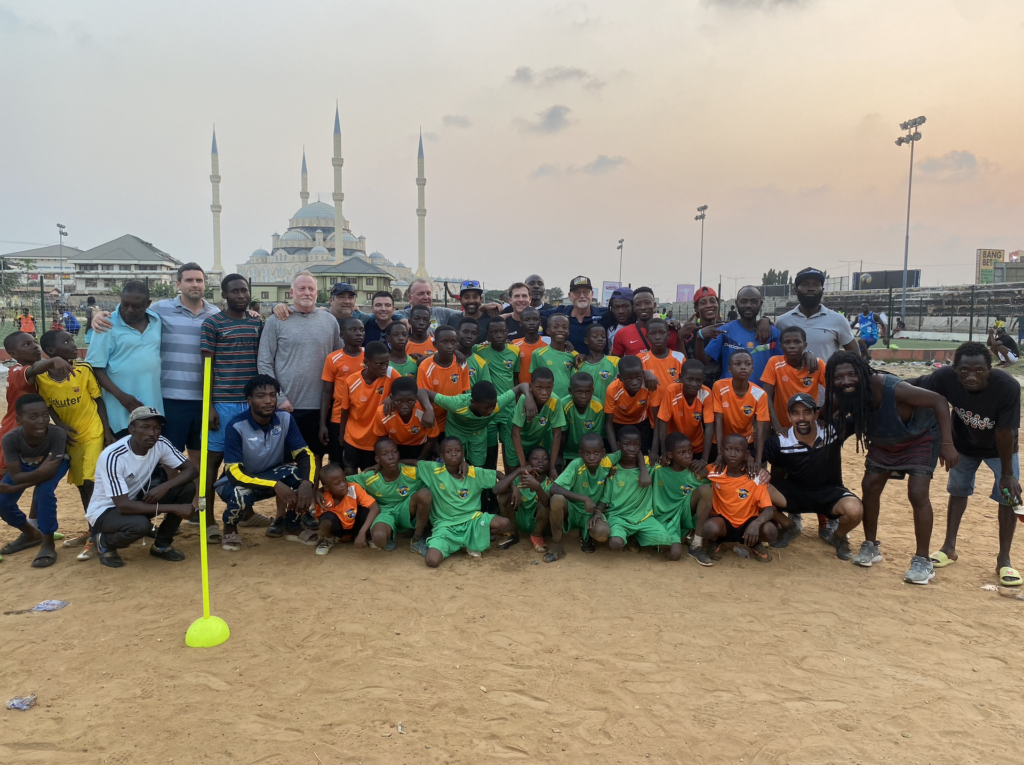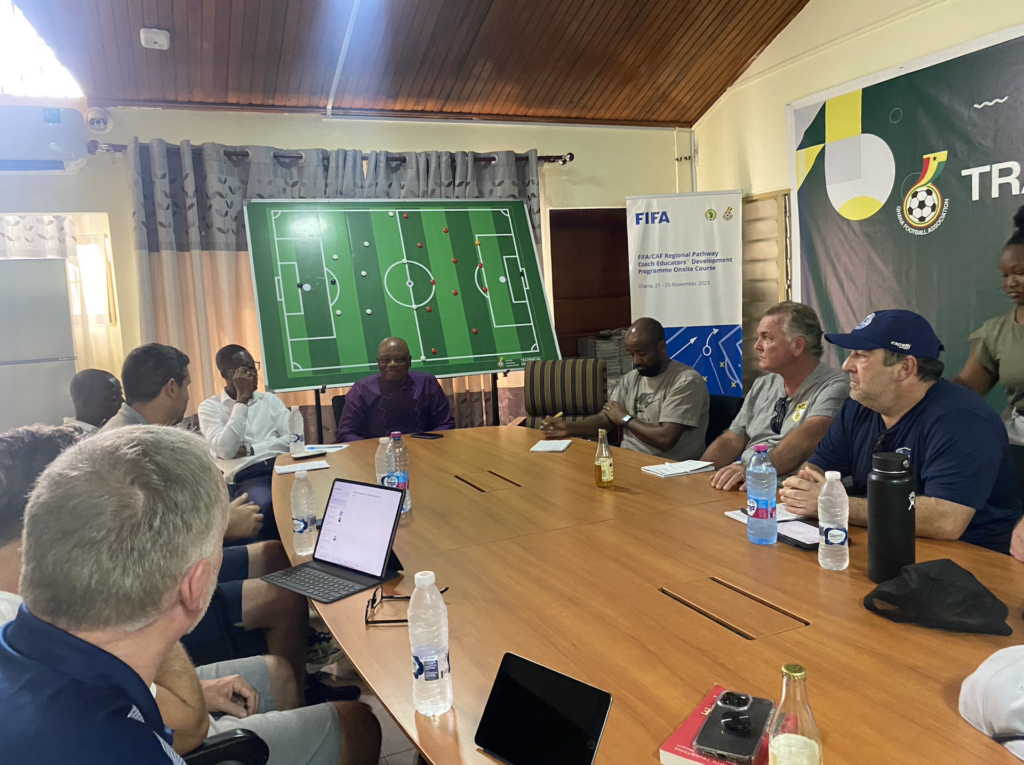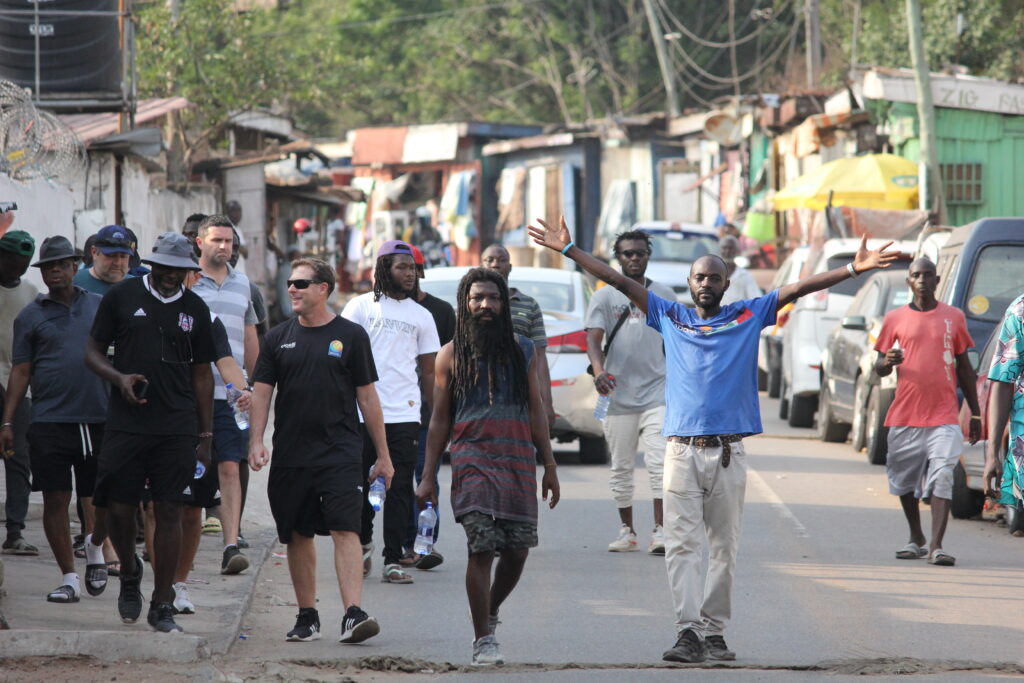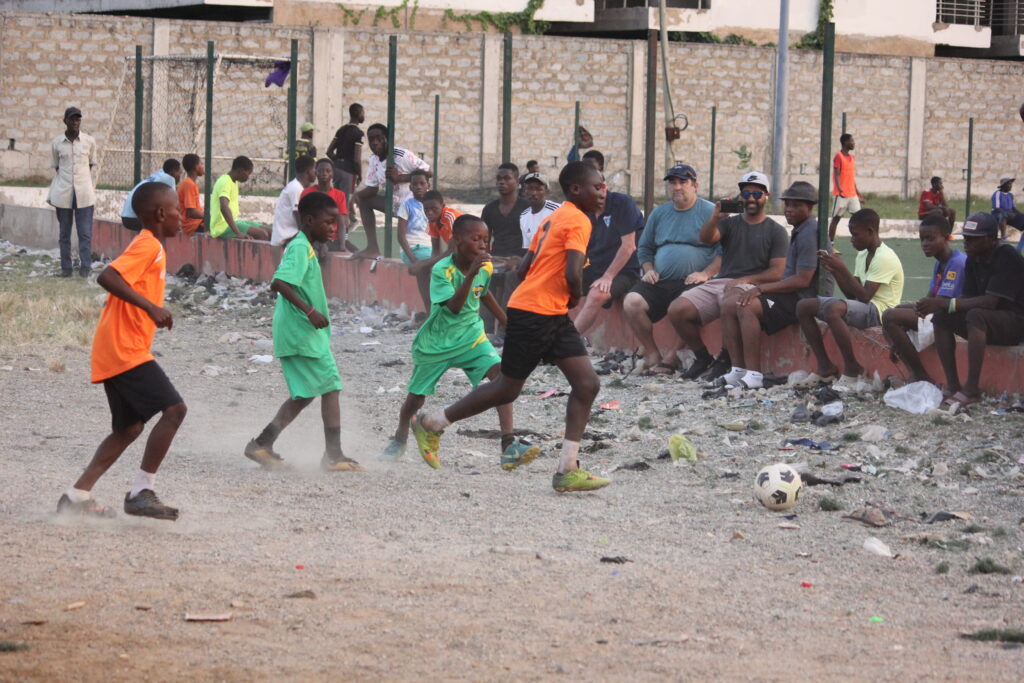NorCal West Africa Coaching Education Trip: Accra

ACCRA, Ghana – One of NorCal Premier Soccer’s key values revolves around providing coaches with multiple and diverse educational opportunities–with the belief, better coaches help make better players.
In NorCal’s desire to better the game locally, it frequently organizes coaches’ education trips, traveling to other parts of the world–for coaches seeking a greater understanding of how to better support their clubs’ players within Northern California.
And while those trips have involved forays into Europe and Latin America, for the first time ever, twelve coaches from all across the state traveled to Africa for a two-week lesson split in between soccer hotbeds Ghana and Côte d’Ivoire.
The learning experience began Monday in Accra, the capital of Ghana, with a presentation from current Ghana U17 Girls National Team coach Baba Nuhu Mallam, who gave the coaches an overview of the selection and development process for the program, before the group explored the country’s national stadium and took in a third division game.
The coaches from NorCal felt an instant connection with the culture in Ghana, receiving warm welcomes from all and bonding over a shared love of football.
The following day, the dozen visited a training session at local third tier club, MSK Zilina, who have a player development and pathway partnership with the club in Slovakia due to the large amount of raw talent the country produces.
The NorCal coaches then traveled to the Ghana Football Association’s Technical Department headquarters to meet with GFA Technical Director Professor Joseph Kwame Mintah to discuss the successes, challenges and ongoing football development initiatives of the country’s youth and professional setups.

According to Mintah, the strength of Ghana when it comes to developing players, is their innate desire to play the game.
“The average Ghanaian child learns how to crawl after learning about the soccer ball–they want to keep the ball and dance around it.” Mintah said. “And you don’t have to teach them how to dance.”
“Kids in Ghana love football, it’s everything,” he added. “Every day the kids wake up and look forward to school being over so they can play.”
While the passion of the game in Ghana starts at birth, Mintah detailed the multitude of difficulties the country faces in taking its game to the next level, most of which revolve around a lack of funding compared to other successful football nations, and organizational challenges,
Put simply, the level of most facilities, coaching education, and funding stands well behind where Ghana would like to be. Most of the kids play on dirt fields, there are not sufficient opportunities for all grassroots coaches throughout the country to continue their coach education journey to the highest possible level.
While progress has been made in recent years by developing a national coach education infrastructure, including delivering CAF D Licenses in each region and dialect, the capital to improve those aspects of the game to the desired level is a challenge at the moment.
Mintah, who lived, studied, and coached in the United States, believes that the positives and negatives of soccer culture in the States are almost entirely reversed. The facilities are pristine, coaching education is somewhat robust, and there’s plenty of funding to go around in certain parts of the country.
For Mintah, the problems in the US are distractions, competition from other sports, and a soccer culture that has grown but isn’t instilled from birth.
“In the United States, the challenge from day one is that you only do things with your hands,” he said, referring to regions where sports such as baseball and basketball are most popular

Once the meeting concluded, the NorCal coaches bussed across the city to the Nima district, an impoverished area similar to the Brazilian favelas, known for producing quality players such as current Ghana National Team standout midfielders Mohammed Kudus (West Ham United, England) and Majeed Ashimeru (Anderlecht, Belgium).
In Nima, the togetherness of the community stood out–each and every person supported each other through their shared hardships and reveled in the successes of those who made it at the highest level in soccer.
Following a one hour walk through the neighborhood, which put into context the living conditions some of Ghana’s best-ever players have risen from, it was finally time to watch more youth trainings.
Strong Tower FC, Kudus’ and Ashimeru’s former club, hosted the NorCal contingent at a local youth complex featuring two makeshift dirt fields and one turf pitch that comprise the entirety of the grounds for 10 different youth organizations.
While some coaches watched and took notes, four jumped in to assist with a training session with the local youngsters, leading a group of preteens through a technical training that followed with small sided games.

“To see the passion for football and challenges that at least two countries in Africa deal with in delivering football and the frustrations and the joys was an eye-opening experience,” said NorCal President Benjamin Ziemer. “It’s incredible to see an area embrace football in the way the locals in Ghana do. There were 10 clubs in the area we visited. The players have such passion, as well as the coaches and the fans, who were just sitting around watching to try to support young children to keep them moving forward.”
“It’s clear why Africa is producing some of the world’s most exciting players, growing in competitiveness in the world’s game, and will one day win a World Cup because there’s football everywhere,” Ziemer added. “The kids play everywhere, sometimes with no shoes, running over rocks on fields that parents or coaches wouldn’t let their kids near in the United States.”
“It would be interesting to see US Soccer, and ourselves at NorCal Premier, embark upon a project celebrating football, so even more children become even more enamored with the game, playing, watching, dreaming the game–and sustaining a passion for the game like we’ve found on this continent,” Ziemer concluded.













